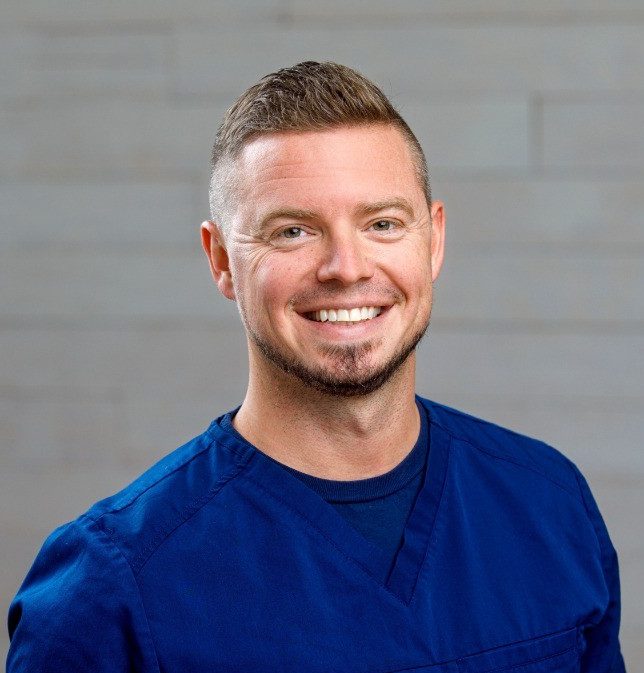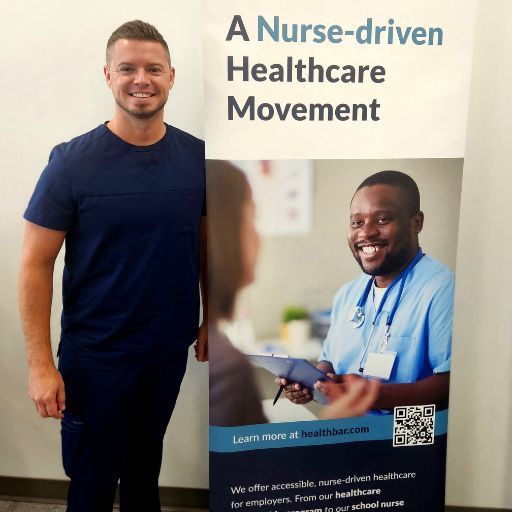Wanting to make health care more affordable and easier to access, Nathan Baar launched HealthBar in May 2020. Based in Grand Rapids, Michigan, his company provides primary and preventive care services across Michigan to businesses and schools via teams of nurses and nurse practitioners.
Structured as a concierge model, HealthBar’s services range from onsite clinics and virtual health to home care, nurse navigation and chronic-illness management. “We also do a lot of behavioral coaching to help people make better choices for healthier lifestyles,” says Baar, a registered nurse and former hospital administrator.

By charging businesses a monthly fee rather than billing insurance, HealthBar is able to deliver higher quality care at lower costs (typically saving a net 7-14% over their medical spend). Instead of waiting weeks to see a doctor or going to urgent care, clients can get same-day access to health care from their dedicated concierge team. “Insurance as a benefit is more of a pay-to-play for most organizations,” Baar says. “People equate insurance to healthcare, which isn’t true. Insurance is just a payment mechanism; it doesn’t provide health care. Benefits strategies need to advance to help with recruitment and retention efforts, along with reducing health care costs.”
By 2023 HealthBar was generating more than $2.5 million in annual revenue with 40 employees — and was the recipient of several awards, including the Michigan 50 Companies to Watch. “The recognition comes with a lot of weight and brings a level of credibility,” Baar says. “I think it reinforces the quality of our organization and is something we’ve been very proud of and have promoted.”
Being a CTW honoree also enabled Baar to take advantage of several Edward Lowe Foundation programs, which are co-funded in Michigan by the foundation and the Michigan Economic Development Corp.:
- PeerSpectives® roundtables — This CEO roundtable program brings together second-stage owners from different industries to discuss growth challenges in a confidential environment. In particular, Baar appreciates his roundtable’s diverse representation of industries, which included marketing, manufacturing, HR and entertainment. “Hearing the similar issues that we’re all experiencing and how people are tackling them is really beneficial,” he says. “I also like how the protocol stresses that we speak from experience in all of our conversations, rather than give advice.”
- Educational retreats — Baar has attended several leader retreats at Big Rock Valley (BRV), the foundation’s 2,000-acre learning campus in southwest Michigan. “Big Rock Valley has a feel to it that is hard to explain. The retreats and the facility are put together in a way that allows you to step away from the business and really think,” he says. “Hearing the stories of Ed Lowe, being able to sit around the campfire and learning from others was really impactful. And perhaps my biggest takeaway was understanding the need to take time out to do this.” Indeed, teaming up with a member from his PeerSpective roundtable, Baar brought HealthBar’s senior managers to BRV for a separate retreat to share the experience, which he says increased his team’s cohesiveness.
- The System for Integrated Growth® (SIG) — A virtual program, SIG enables participants to work with business experts on specific growth issues. For his SIG engagement, Baar was looking for help with sales processes and HR systems. Among deliverables, an HR expert provided information about online HR and payroll management systems. “I was able to get clarity on different products, and the SIG experience helped reinforce not only the need for such a system, but also our end selection,” Baar says. Referring to Rippling, he says the workforce management platform has given HealthBar a central repository for personnel information and makes payroll significantly easier to process. “We’re using it some for recruitment as well,” he adds. “Anecdotally, I know it has made our onboarding processes much, much better.”
Another SIG specialist helped Baar with best practices for hiring salespeople along with a template for developing a sales process. “We didn’t have much structure before, and this brings a lot of clarity to the team regarding what we do and who is responsible at each stage,” Baar says. Indeed, armed with a formal sales process, HealthBar was able to close several new accounts within 90 days — ending a six-month dry period on business development.
As HealthBar continues to scale and expand outside of Michigan, learning how to develop and implement structure is important. “Companies in our stage get overlooked a lot,” Baar says. “Having a resource like the foundation that is focused on second-stage companies is extremely important. Other programs may open doors, but none of them offer the ‘guided tour’ that the Edward Lowe Foundation does.”
